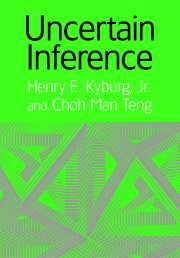Book contents
- Frontmatter
- Contents
- Preface
- 1 Historical Background
- 2 First Order Logic
- 3 The Probability Calculus
- 4 Interpretations of Probability
- 5 Nonstandard Measures of Support
- 6 Nonmonotonic Reasoning
- 7 Theory Replacement
- 8 Statistical Inference
- 9 Evidential Probability
- 10 Semantics
- 11 Applications
- 12 Scientific Inference
- Names Index
- Index
11 - Applications
Published online by Cambridge University Press: 07 December 2009
- Frontmatter
- Contents
- Preface
- 1 Historical Background
- 2 First Order Logic
- 3 The Probability Calculus
- 4 Interpretations of Probability
- 5 Nonstandard Measures of Support
- 6 Nonmonotonic Reasoning
- 7 Theory Replacement
- 8 Statistical Inference
- 9 Evidential Probability
- 10 Semantics
- 11 Applications
- 12 Scientific Inference
- Names Index
- Index
Summary
Introduction
We are now in a position to reap the benefits of the formal work of the preceding two chapters. The key to uncertain inference lies, as we have suspected all along, in probability. In Chapter 9, we examined a certain formal interpretation of probability, dubbed evidential probability, as embodying a notion of partial proof. Probability, on this view, is an interval-valued function. Its domain is a combination of elementary evidence and general background knowledge paired with a statement of our language whose probability concerns us, and its range is of [0, 1]. It is objective. What this means is that if two agents share the same evidence and the same background knowledge, they will assign the same (interval) probabilities to the statements of their language. If they share an acceptance level 1 – α for practical certainty, they will accept the same practical certainties.
It may be that no two people share the same background knowledge and the same evidence. But in many situations we come close. As scientists, we tend to share each other's data. Cooked data is sufficient to cause expulsion from the ranks of scientists. (This is not the same as data containing mistakes; one of the virtues of the system developed here is that no data need be regarded as sacrosanct.) With regard to background knowledge, if we disagree, we can examine the evidence at a higher level: is the item in question highly probable, given that evidence and our common background knowledge at that level?
There are a number of epistemological questions raised by this approach, and some of them will be dealt with in Chapter 12.
- Type
- Chapter
- Information
- Uncertain Inference , pp. 247 - 269Publisher: Cambridge University PressPrint publication year: 2001



